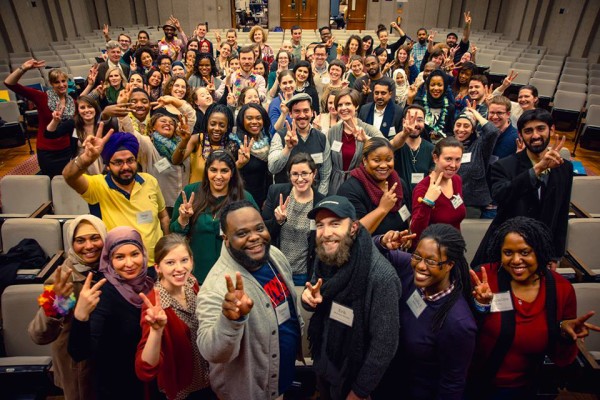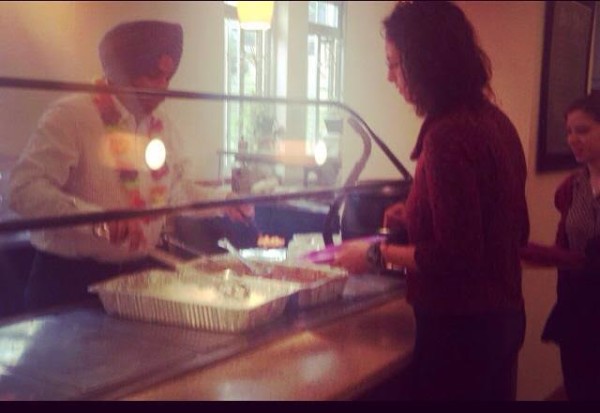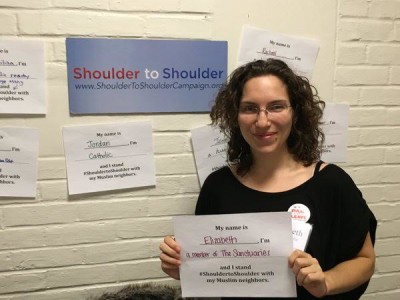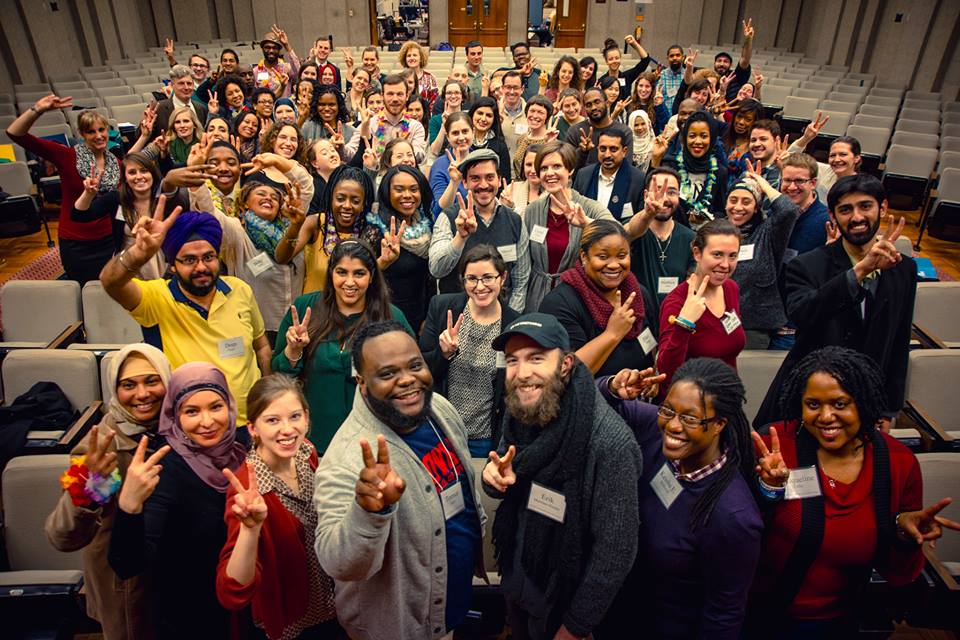
On February 7th, over 150 young adults of religions ranging from Jewish, Muslim, and Catholic to Sikh, Hindu, Baha’i, and humanist, gathered together at the Howard University School of Divinity for the DC Interfaith Leadership Summit. Hosted by the InterFaith Conference of Metropolitan Washington as part of World Interfaith Harmony Week, it was a celebration of communal spirituality and interconnectivity. I was excited to have the opportunity to connect with my Judaism while also finding new ways of exploring my faith.
The day started off as rainbow-colored flower necklaces were distributed to attendees and a Sikh participant explained how he saw the chain of multi-colored flowers as a representation of interfaith connection, in that we are all unique and beautiful and connected through the divine. What followed were the soulful sounds of The Sanctuaries, an artist collective that performed a set of spoken word and hip-hop fusion, Following the opening jam session, attendees ate a kosher vegetarian lunch served by the Guru Gobind Singh Sikh Foundation. Over chana masala, Jews and Sikhs discussed dietary observations and the similarities between keeping kosher and being vegetarian.

The organizations involved included Jews United for Justice, Dar Al-Hijrah, the Association of United Hindu & Jain Temples, the Jewish Community Relations Council, and the Am Kolel Jewish Renewal Community. Attendees had the opportunity to find out more about these different organizations at the resource fair in between sessions on spirituality, balancing religious and secular life, as well as prayer.
The InterFaith Conference was founded in 1978, but according to Jack Gordon, the summit organizer, the summit is a newer development of the Conference’s work.
“In 2012, I approached a group of friends who were emerging leaders in their respective communities and pitched the idea for what became our Interfaith Summit,” he said.
“Thanks to my involvement with the IFC, I was meeting a lot of young adults in various communities who were doing great work, mobilizing folks in their own tradition, but in a lot of cases weren’t interacting with peers from other backgrounds. Even though we’re the most diverse generation in history, we still have to be intentional in our approach to being allies and creating systematic efforts to building community across lines of religion, race, et cetera.”
He added that it felt worthwhile to create a space where young people who were already in leadership positions could simply meet, start those new friendships and get the resources needed for future collaborations.

“Our summit doesn’t attempt to create yet another cause for our young leaders to commit to,” he said. “Its intention is to be a place to reflect on one’s experience with others serving in similar roles, and to be a catalyst for new relationships that can hopefully help the work they are already doing.”
Gordon is from an interfaith family — “Jewish on my father’s side, mostly Christian on my mother’s” — but was raised Jewish, having had a bar mitzvah, attending Hebrew school, going to synagogue, and attending Habonim Dror camps.
“Although I was in a Conservative community, my own practice was much more cultural than religiously motivated,” he said.
In college, he started learning about the Baha’i Faith from his maternal grandmother and a cousin on his mother’s side, who were both part of that community. The teachings of the Baha’i appealed to him, in part because it helped him reconcile the antagonism he felt towards Christianity as an oppressive, often anti-Semitic force. He said he gained a better appreciation for his Christian family and neighbors, and learned about the beauty of Islam as well. The Baha’i Faith helped him draw a positive connection through these traditions, and at the same time it didn’t demand that he reject his Jewish identity.
“So, today I say my cultural identity is Jewish and my religious practice is Baha’i,” Gordon said. “It’s a dynamic relationship and one definitely informs the other.”
I also asked Sy Majidi, who helped organize a pre-event on the Baha’i Faith, why he gets involved in interfaith activities.

“I see in both the individuals that participate in the Interfaith Summit and in the sacred writings of the world’s great religions, a shared emphasis in developing human virtue to improve both oneself and the community that we are all a part of. It is this an essential aspect of religion that we make up a shared spiritual heritage to all peoples of the world,” Majidi said.
“This Interfaith Summit provides an important space for individuals to share different perspectives of how we express this developing virtue, or spirituality, in our shared communities.”
Ultimately, the summit offered a safe space for individual cultivation of what it means to be connected to something greater than ourselves and find our own connection with the divine. There is space for all of us. After all, to quote Rabbi Abraham Joshua Heschel: “To be spiritual is to be amazed.”
Correction: This article previously stated that the DC Interfaith Leadership Summit took place on Feb. 4. It took place on Feb. 7.
New Voices regrets the error.
Michele Amira is a student at the University of Maryland.

